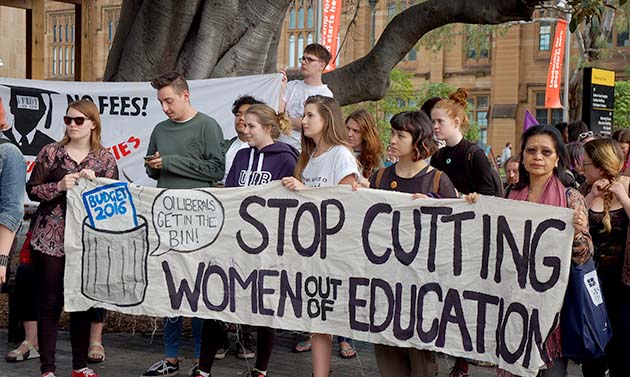Treasurer Scott Morrison didn’t mention higher education in his budget speech. But the Liberals remain determined to cut university spending and hike student fees. They have had to walk away from full fee deregulation, citing “community concern”.
But major reforms have simply been delayed one more year, until the beginning of 2018. The Liberals are hoping to keep their plans quiet until after the election.
A “discussion paper” has been released which outlines “options” including:
- Deregulation fees for “flagship” courses
- Increasing student fees to raise students’ contribution from 40 per cent to 50 per cent of the cost of degrees
- Lowering the income threshold for beginning HECS repayments (e.g. from $54,000 to $42,000)
- Collecting unpaid HECS from the dead, or tying repayments to household income
But the Liberals have already decided to cut almost $2 billion from the sector over the next four years, mainly through a 20 per cent cut to funding when their reforms are implemented in 2018. Universities would be told to recoup this money from higher student fees.
The discussion paper suggests that deregulated “flagship” courses, where universities could charge fees at whatever level they like, could enroll fully 20 per cent of students. This could still see $100,000 degrees become a reality.
Unsustainable spending?
The Liberals want us to believe that university spending has become “unsustainable” due to increasing costs, more student enrolments and unpaid student debts. But this is a whole lot of hot air.
The Parliamentary Budget Office report, which supposedly raised the alarm on debt growth, predicted an increase in the annual cost to government of HECS-HELP loans from $1.7 billion in 2015-16 to $11.1 billion in 2025-26.
But the main cause of this was the assumption of higher fees due to fee deregulation.
Government spending on higher education is currently around $9 billion a year, about 0.7 per cent of GDP. This is well below the average in the OECD club of rich nations of 1.1 per cent.
Education is not an individual choice or personal privilege. Business needs highly educated graduates in fields like IT, science and communications.
The government’s own discussion paper highlights this, saying “Higher education…is a key source of innovation for business and industry, central to Australia’s successful economic transition”.
As a social good, university should be free—just as primary and secondary education are. It can be funded through taxing corporations and the rich instead of slugging students.
The fight against Abbott’s 2014 budget showed that protests work. Student rallies, along with “Bust the Budget” demonstrations, helped defeat the bulk of Abbott’s budget.
The next year will see ongoing discussions between university bosses and the government over the reforms and increases to student fees. Students will need to protest and campaign to raise awareness and explain how universities could be funded.
There is every reason to believe we can beat Turnbull. People can see he stands for everything Abbott did: refugee cruelty, homophobia, climate inaction, attacking Medicare, union-bashing, and handouts for the rich.
We need to connect these issues and build a united fightback against the Liberals’ agenda.






